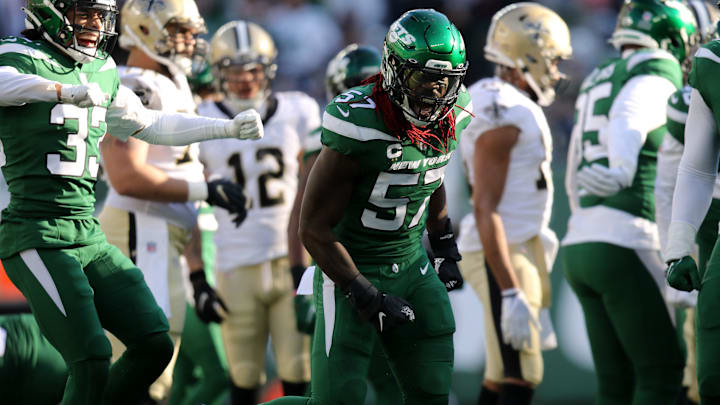
2. The NY Jets need a free safety
Out of the three positions highlighted in this article, safety is the only one where the Jets actually invested significant resources this offseason, re-signing Lamarcus Joyner and adding Jordan Whitehead. Still, Douglas would be wise to add another safety to the group.
At one point in his career, Joyner was an elite safety for the Rams. He went to the Raiders, however, who moved him to cornerback, where he floundered. Douglas brought him in last offseason, but Joyner got injured early on and missed effectively the entire season. Joyner notched a terrific 91.0 PFF grade back in 2017 and a solid 74.9 the year after while he still played safety.
The following two seasons at cornerback, however, were very forgettable, as Joyner received sub-55.0 grades both seasons. For Joyner to solve the Jets FS problem, he would have to both return to 2017 form and avoid injury, both of which could be difficult for the 31-year-old.
Former third-round pick Ashtyn Davis could also potentially start at free safety for the Jets, but his NFL track record has been subpar. While he racks up solid fumble and tackle numbers, he tends to struggle in coverage (a free safety’s most important skill) and has barely broken a 60 PFF grade in his career.
Last up are Will Parks and Jason Pinnock, both of whom actually performed very well this past year but in a very limited sample size. Parks received an impressive 78.7 PFF grade this year, but based on just 90 defensive snaps.
Pinnock also received a solid PFF grade on limited snaps but perhaps in a more meaningful way. He was drafted as a cornerback and started his career there before being converted to safety. Following the position switch, the fifth-round pick from 2020 performed admirably.
Could Pinnock’s success have been a true indication of his talent as a free safety or was he merely lucky in a small sample? In Pinnock’s favor, following the Pitt product’s switch to safety, head coach Robert Saleh likened him to Jimmie Ward, a very important piece at safety for the 2019 49ers defense.
Rather than betting on one of Joyner, Davis, Parks, or Pinnock to rise to the occasion, Douglas could look to the draft to address the need at safety.
Notre Dame unicorn Kyle Hamilton could be Douglas’ choice at the fourth pick after excelling at just about every aspect of the game this past season for the Fighting Irish.
Standing at 6-foot-4, 220 pounds, a freakish size for the position, Hamilton brings elite size and instincts that could easily land him in several Pro Bowls throughout his career.
To snag Hamilton, though, Douglas would have to spend the fourth pick in the draft on him. That may be a bit too rich for a safety, especially in a scheme that merely demands reliable zone coverage of their safeties and would potentially waste Hamilton’s many talents.
Also, Hamilton's athletic testing at the Combine was not as outstanding as many hoped it would be.
Plus, after Hamilton follows a multitude of talented safeties that could probably be had at the beginning of the second round. One of those players is Lewis Cine, the hardest hitter in the class. Another piece of that Georgia defense, Cine played more of a strong safety role, a spot that’s currently being filled by Jordan Whitehead.
In terms of free safeties, the Jets could look to Jaquan Brisker or Daxton Hill. Brisker is a do-it-all safety with no clear weakness. A versatile and athletic defensive back, Brisker could potentially start Week 1, but his zone coverage needs some work if he wants to be a long-time starter at the position.
Last up is Hill, another spectacular athlete who ran a 4.38 at the NFL Combine. Hill was a reliable coverage safety for Michigan this past year, notching eight pass deflections and two interceptions, and projects as the best free safety out of these three potential second-rounders.
Likewise, he probably makes the most sense for Gang Green, who would place him across from a feisty heatseeker in Whitehead.
